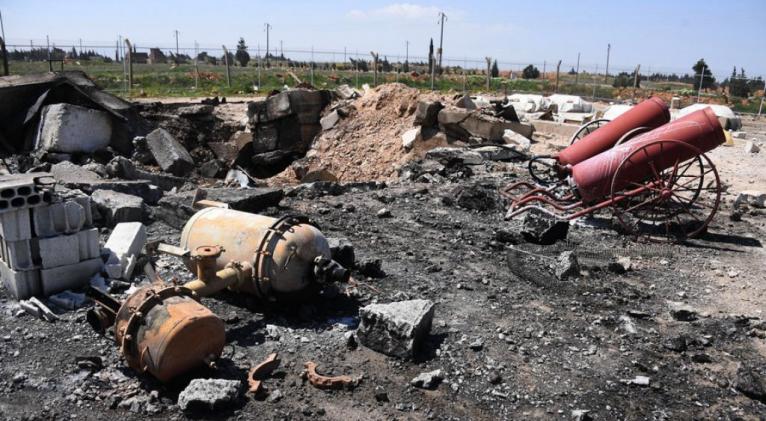US missile strike in Syria: What we know so far about target, victims & reactions
especiales

The US launched a missile strike on a Syrian airbase, killing at least six people, including civilians, and wounding several others. Reactions to the operation continue to roll in, with Russia condemning it while EU countries and others express support.
US President Donald Trump ordered the military strike on an airfield in Shayrat, near Homs, which resulted in a Friday pre-dawn strike in which 59 Tomahawk missiles were deployed.
Six MiG-23 fighter jets were destroyed in the operation, along with a material storage depot, a training facility, a canteen and a radar station, according to Russia's Ministry of Defense (MoD).
READ MORE: 1st footage of destruction at US-hit Shayrat airbase in Syria (VIDEO)
However, the airfield's runway remained intact, according to the MoD, which described the operation's efficiency as “quite poor.”
Syrian officials have so far confirmed that six people were killed and several others wounded in the operation.
However, the governor of Homs told RT that at least five people had been killed, three of whom were Syrian soldiers. He also stated that at least seven people had been wounded.
Meanwhile, Syria's SANA news agency has reported nine civilian deaths, including four children.
Global reaction
The office of Syrian President Bashar Assad called the US strike “reckless”,“irresponsible” and “shortsighted,” claiming the motives the strike weren't based on true facts.
The Syrian Army called the strike “blatant aggression,” stating that it makes the US a partner of Islamic State (IS, formerly ISIS/ISIL) and other terrorist organizations.
Homs Governor Talal Barazi told Syrian state television that Syria's leadership and policy will not change as a result of the missile attack, pledging that the targeted airfield will be rebuilt and continue to play a role in fighting terrorists.
Russia also condemned the strike, saying it is suspending an agreement with the US to prevent incidents and ensure flight safety during military operations in Syria. Under the agreement, the two sides had exchanged information about planned flights in the area.
Russian Foreign Minister Sergey Lavrov said that strike reminds him of the 2003 invasion of Iraq, which was launched without approval from the UN Security Council. He went on to state that Washington has not presented any evidence to back its allegation that Damascus was behind the chemical attack.
Iran, a key ally of Assad, called the strikes “dangerous” and “destructive,” saying they violate international law.
Meanwhile, European countries have expressed support for the assault, including France, Germany, the UK and Italy.
@DefenceHQ Defence Secretary Sir Michael Fallon has welcomed US strikes on a Syrian airfield last night, saying they were 'limited and appropriate'.
French President Francois Hollande said Assad bears full responsibility for the strike, and said Russia should take it as a “warning” to push for a political solution to the Syrian conflict.
President of the European Council Donald Tusk says the strike is a needed action against “barbaric” chemical attacks, adding that the EU will work with the US to end the Syrian conflict.
@eucopresident US strikes show needed resolve against barbaric chemical attacks. EU will work with the US to end brutality in Syria.
Meanwhile, Turkey has also voiced support for the operation, with Ankara accusing Damascus of “humanitarian crimes.”
Turkish President Recep Tayyip Erdogan called the operation "positive" and a "concrete step taken against the war crimes of the Assad regime," but said it isn't enough on its own. He added that "serious steps" are needed for the protection of innocent Syrians, Reuters reported.
The prime minister of Israel, a staunch ally of the US, said Trump has sent a message that chemical weapons will not be tolerated. Benjamin Netanyahu went on to say that he hopes the message will extend not only to Damascus, but to other countries, including Iran and North Korea.
Saudi Arabia called the strike a “courageous decision” by Trump, expressing its full support, SPA news agency reported, citing a statement from Riyadh. The United Arab Emirates and Bahrain also expressed support for the strike.
Japan has also voiced support for the operation.
China, which has historically sided with Russia at the UN in opposing condemnation of Assad's government, said it had “noted” the latest developments, but did not mention the missile attack specifically. It went on to state that the most urgent task to was to prevent the situation from deteriorating.
Further steps
Following the strike, Moscow called for an emergency meeting of the UN Security Council.
Russian President Vladimir Putin said he regards the strike as an “aggression against a sovereign nation,” according to his spokesman Dmitry Peskov. He also said Putin believes the strike was carried out “in violation of international law” and “under an invented pretext.”
Moscow also vowed to take “a number of measures” to strengthen and improve Syria's air defense system in order to protect “vital parts of Syrian infrastructure,” according to Russian Defense Ministry spokesman Major-General Igor Konashenkov.
The missile strike, which Trump said was in America's national interest in order to prevent the use of chemical weapons, came after a chemical attack took place in Idlib, Syria, earlier this week. The US operation took place before any investigations were concluded.
Up to 86 people, including 26 children, are alleged to have been killed in the chemical attack, with images showing civilians choking and fainting, and some foaming at the mouths.
Washington has accused the Syrian government of being behind the “barbaric” attack.
However, Russia's Ministry of Defense has confirmed that the chemical release was the result of the Syrian Army destroying a rebel warehouse where chemical weapons were being produced and stockpiled before being shipped to Iraq. The ministry called the information “fully objective and verified.”
The Syrian Army also completely denied deploying chemical or toxic material, stating that it “has not used nor will use” such materials “in any place or time, neither in the past or in the future.”















Add new comment